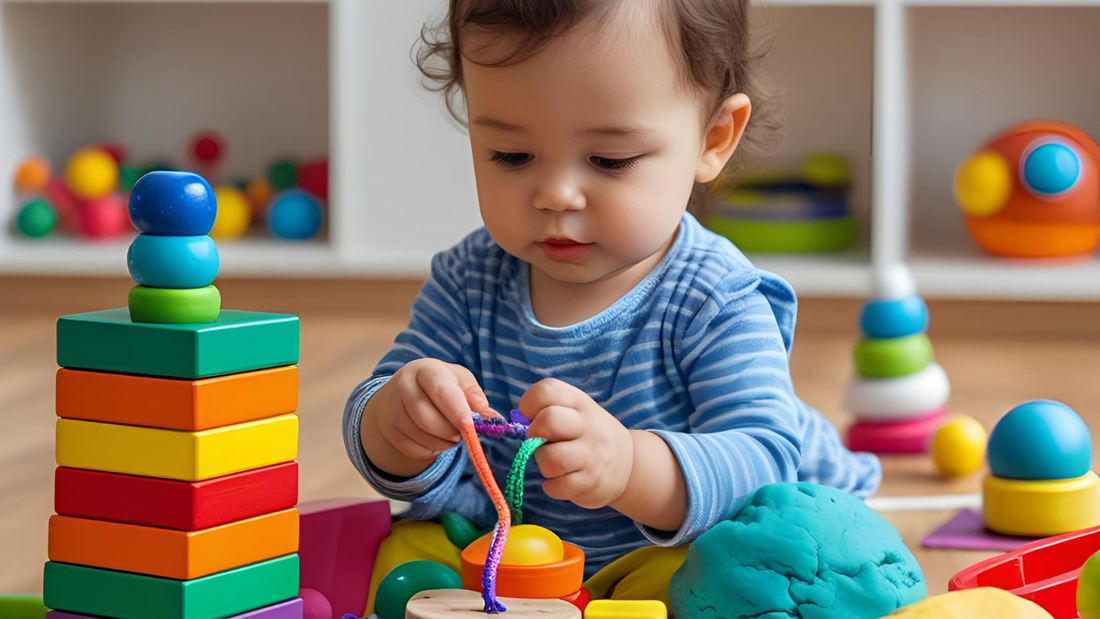
Toys That Masterfully Incorporate Fine Motor Skills
LiLLBUDHave you ever seen your toddler insist on cutting a wobbly line by themselves, peel a sticker with fierce determination or quietly snap together two blocks? Yes, that is how fine motor development works. What's cooler, do you know? They believe they are "just playing."
However, behind the scenes, their tiny fingers are learning life skills like pinching, squeezing, twisting, and gripping that lead to big victories like eating on their own, zipping jackets, and holding a pencil like a pro.
The covert weapon? the appropriate toys. carefully selected ones. enjoyable ones. cunning developmental ones.
Let’s unpack the best toys that quietly turn playtime into skill-building gold.
Builders Gonna Build (and Strengthen Hands Too)
Building toys, which range from magnetic tiles to traditional wooden blocks and fat Legos, are subtle exercise aids for small fingers. Children can improve their hand strength, visual planning, and finger isolation by picking up, stacking, rotating, and disassembling these pieces.
You're raising a future button-fastener and self-assured crayon-gripper, not just a builder.
Pro tip: To boost concentration and perseverance, incorporate some balancing games or stacking challenges.
Lace, Thread, Snap, Repeat
Lacing cards, pop beads, click-together beads, and even pasta-on-a-shoelace are not merely traditional crafts. They are actually fun disguises for brain-body training. Children develop their coordination, hand dominance, and accuracy as they thread or snap.
Bonus: It serves as both a screen-free attention enhancer and a quiet time play.
Pretend Play That’s Surprisingly Functional
Let's discuss miniature tool kits, busy boards, and makeshift kitchens. These aren't limited to fictitious house repairs or soup. They allow your child to practise the small motions they'll need to make in real life, like turning knobs, pressing buttons and holding tiny utensils.
Velcro fruit? cutting abilities. A screwdriver? Wrist control. Dolly's coat zipping? Baby, independence.
They’re not “just pretending”—they’re rehearsing real-world readiness. (Shh... don’t tell them.)
Squeeze, Squish, and Sculpt (Sensory Play For The Win)
The messiest toys can sometimes be the best for fine motor skills. Kinetic sand, sensory bins, play dough, and textured squishy toys are all enticing ways to strengthen your hand muscles.
To increase the motor challenge, give them plastic tweezers, rolling pins, or tiny cutters. Without the monthly membership, it's similar to a hand gym.
Pro parent move: Pair dough with muffin tins, cookie cutters, or tongs for endless open-ended play.
Tiny Artists, Big Coordination Wins
Books with stickers. painting with water. chubby crayons. Baby-safe scissors. Yes, art supplies are your best bet for developing fine motor skills. The pincer grip is strengthened when stickers are peeled off. Cutting improves coordination between the two parties. Writing later on is facilitated by holding crayons correctly.
As their control improves, gradually move from chunky materials to thinner tools. Don't worry about the mess; gluey fingers are simply a sign of good motor skills.
How You Set Up Matters (Yes, Even the Shelf)
A playroom fit for Pinterest is not necessary. But six or eight interesting activities on a low toy shelf that is rotated every week? It's just pure magic. Your toddler gains the ability to make decisions, concentrate, and play intentionally. It fosters self-reliance and focus, two qualities that support the growth of those small muscles.
A construction set, a craft tray, a threading toy, a puzzle, and a sensory bin should all be included for variety. Bam—all levels of motor skills.
Try These Fine Motor Boosters from LiLLBUD:
Final Thoughts: The Power of Play... Just Smarter
The key to a toddler's independence is their fine motor skills. Fortunately for us, they can develop without worksheets or drills. All they require is the appropriate play, with the appropriate toys, at the appropriate time.
So feel free. For the 400th time, let them lace the bead. Peel all of the book's stickers. Like a young pastry chef in training, mash dough.
Behind those enjoyable moments? self-assurance. coordination. Ability. And before you know it, they will be making their own sandwiches, writing their names, or zipping their coat.
All thanks to play. Smart, joyful, and just the way it should be.

